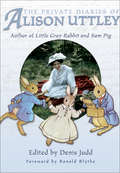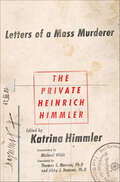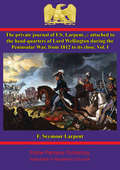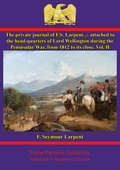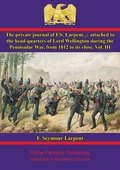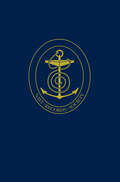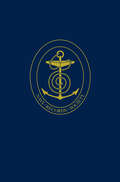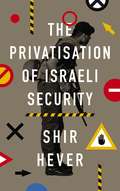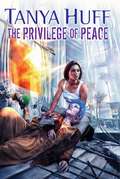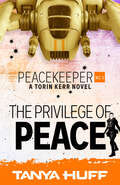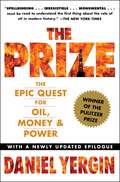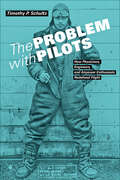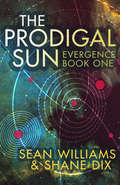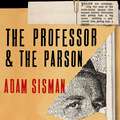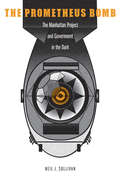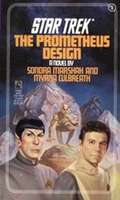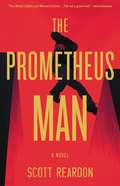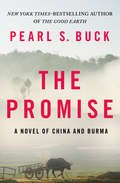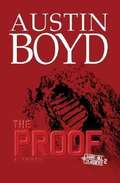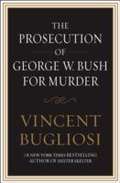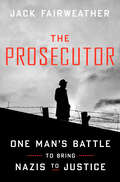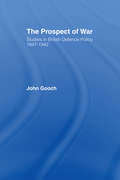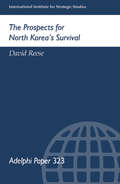- Table View
- List View
The Private Diaries of Alison Uttley: Author of Little Grey Rabbit and Sam Pig
by Denis JuddPopular childrens author, Alison Uttley (Little Grey Rabbit and Sam Pig) spent over 40 years writing diaries. Professor Denis Judd, who knew Alison and has previously written her biography, reveals a different side to the writer whose husband committed suicide and whose close relationship with her son is recorded in detail. But the magic of the author rings through on every page as she writes about her daily life in Berkshire, the red lipped fisherwife near neighbor (better known as Enid Blyton!) and her tempestuous relationship with her illustrators. She also writes endearingly about the changing seasons, reflecting much of her adult writing. These beautifully written diaries have been skillfully edited by Denis Judd, one of the Trustees of her Estate and a renowned biographer in his own right. Wonderfully written with a truly nostalgic look at days long gone, this is a must-read not just for fans of Alison Uttley's work but for anyone who enjoys good writing.
The Private Heinrich Himmler: Letters of a Mass Murderer
by Michael WildtThe English translation of the letters of Heinrich Himmler and his wife, recently authenticated by the Bundesarchiv and serialized in Die WeltAt the end of World War II, it was assumed that the letters of Heinrich Himmler were lost. Yet sixty years after Himmler's capture by British troops and subsequent suicide, the letters mysteriously turned up in Tel Aviv and, in early 2014, excerpts were published for the first time by the Israeli newspaper Yediot Aharonot providing a rare, if jarring, glimpse into the family life of one of Hitler's top lieutenants while he was busy organizing the mass extermination of the Jews. It was generally held that Himmler, once appointed head of the SS, blended seamlessly into the Nazi hierarchy. The image that emerges, however, is more subtle. Himmler is seen here as a man whose observations can often be characterized by their unpleasant banality; a man whose obsession with family life ran alongside a brutal detachment from all things human, a serial killer who oversaw the persecution and extermination of all Jews and other non-Aryans, and those opposed to the regime. His letters remove any doubt that he was the architect of the Final Solution, and a man who was much closer to Hitler than many historians previously thought.The letters in this edition were arranged by Katrin Himmler, the great-niece of Heinrich and Marga Himmler, and Michael Wildt, a renowned expert on the Nazi regime, who also provide historical context to the letters and their author. The entire work was translated by Thomas S. Hansen and Abby J. Hansen.
The Private Journal of F.S. Larpent - Vol. I: attached to the head-quarters of Lord Wellington during the Peninsular War, from 1812 to its close (The Private Journal of F.S. Larpent #1)
by Sir George Larpent F. Seymour LarpentWellington added a Judge-Advocate-General to his staff in 1812 "to ensure that courts-martial were conducted with proper forms and due appreciation of the validity of evidence - in which the commander-in-chief considered that they had often failed . . . Larpent, who has left an interesting diary of his duties and his personal adventures [he was captured briefly in 1813 but immediately exchanged], discharged the function of this office . . . down to the end of the war" (Oman, Wellington's Army pp. 159-160). "When in the Peninsula, Larpent wrote descriptive letters to his stepmother, Anna Margaretta Larpent. Publication of this important first-hand account of Wellington's headquarters was deferred until after Wellington's death. The letters were edited, with a biographical preface by Larpent's half-brother, Sir George Larpent, first baronet (1786-1855), in 1853 and passed through three editions in the same year" (Oxford DNB).Author -- Larpent, F. Seymour 1776-1845.Editor -- Larpent, George, Sir, 1786-1855.Text taken, whole and complete, from the edition published in London: R. Bentley, 1853.Original Page Count - 296 pages.
The Private Journal of F.S. Larpent - Vol. II: attached to the head-quarters of Lord Wellington during the Peninsular War, from 1812 to its close (The Private Journal of F.S. Larpent #2)
by Sir George Larpent F. Seymour LarpentWellington added a Judge-Advocate-General to his staff in 1812 "to ensure that courts-martial were conducted with proper forms and due appreciation of the validity of evidence - in which the commander-in-chief considered that they had often failed . . . Larpent, who has left an interesting diary of his duties and his personal adventures [he was captured briefly in 1813 but immediately exchanged], discharged the function of this office . . . down to the end of the war" (Oman, Wellington's Army pp. 159-160). "When in the Peninsula, Larpent wrote descriptive letters to his stepmother, Anna Margaretta Larpent. Publication of this important first-hand account of Wellington's headquarters was deferred until after Wellington's death. The letters were edited, with a biographical preface by Larpent's half-brother, Sir George Larpent, first baronet (1786-1855), in 1853 and passed through three editions in the same year" (Oxford DNB).Author -- Larpent, F. Seymour 1776-1845.Editor -- Larpent, George, Sir, 1786-1855.Text taken, whole and complete, from the edition published in London: R. Bentley, 1853.Original Page Count - 309 pages.
The Private Journal of F.S. Larpent - Vol. III: attached to the head-quarters of Lord Wellington during the Peninsular War, from 1812 to its close (The Private Journal of F.S. Larpent #3)
by Sir George Larpent F. Seymour LarpentWellington added a Judge-Advocate-General to his staff in 1812 "to ensure that courts-martial were conducted with proper forms and due appreciation of the validity of evidence - in which the commander-in-chief considered that they had often failed . . . Larpent, who has left an interesting diary of his duties and his personal adventures [he was captured briefly in 1813 but immediately exchanged], discharged the function of this office . . . down to the end of the war" (Oman, Wellington's Army pp. 159-160). "When in the Peninsula, Larpent wrote descriptive letters to his stepmother, Anna Margaretta Larpent. Publication of this important first-hand account of Wellington's headquarters was deferred until after Wellington's death. The letters were edited, with a biographical preface by Larpent's half-brother, Sir George Larpent, first baronet (1786-1855), in 1853 and passed through three editions in the same year" (Oxford DNB).Author -- Larpent, F. Seymour 1776-1845.Editor -- Larpent, George, Sir, 1786-1855.Text taken, whole and complete, from the edition published in London: R. Bentley, 1853.Original Page Count - 293 pages.
The Private Papers of John, Earl of Sandwich: 1771-1782, Vol. III
by G.R. Barnes J.H. OwenThe Fourth Earl of Sandwich was First Lord of the Admiralty (for the third time in his long career) from 1771 to 1782. Blamed by the Whig opposition for many of the disasters of the American War, he was additionally loaded by 19th-century Whig historians with the false image of a corrupt libertine.It was the publication of these volumes of his correspondence and papers (then in the family home, now in the National Maritime Museum), covering the years 1771 to 1782, which restored his reputation as a conscientious and imaginative naval administrator and reformer, especially of the dockyards and of the timber question. Without entirely rescuing his status as a strategist, they showed very clearly the weaknesses at the heart of the North administration which damaged its handling of the war, and undermined Sandwich’s efforts.A fifth volume intended to cover his handling of naval patronage was overtaken by the war.This volume is from May 1779 to December 1780.
The Private Papers of John, Earl of Sandwich: 1771-1782, Vol. IV
by G.R. Barnes J.H. OwenThe Fourth Earl of Sandwich was First Lord of the Admiralty (for the third time in his long career) from 1771 to 1782. Blamed by the Whig opposition for many of the disasters of the American War, he was additionally loaded by 19th-century Whig historians with the false image of a corrupt libertine.It was the publication of these volumes of his correspondence and papers (then in the family home, now in the National Maritime Museum), covering the years 1771 to 1782, which restored his reputation as a conscientious and imaginative naval administrator and reformer, especially of the dockyards and of the timber question. Without entirely rescuing his status as a strategist, they showed very clearly the weaknesses at the heart of the North administration which damaged its handling of the war, and undermined Sandwich’s efforts.A fifth volume intended to cover his handling of naval patronage was overtaken by the war.This volume is from 1781 to 1782. The planned fifth volume was never completed.
The Privatization of Israeli Security
by Shir HeverIn this book, Shir Hever considers the impact of the ongoing Palestinian resistance to Israeli occupation, the influence of U.S. military aid and the rise of neoliberalism in Israel, to make sense of this dramatic change in security policy.Through the lens of political economy, this book shows how the Israeli security elites turn violence into a commodity in order to preserve their status and wealth, providing a fresh new perspective on the Israeli occupation.
The Privilege of Peace (Peacekeeper #3)
by Tanya HuffFormer space marine Torin Kerr returns for one final adventure to save the Confederation in the last book in the military science fiction Peacekeeper trilogy.Warden Torin Kerr has put her past behind her and built a life away from the war and everything that meant. From the good, from the bad. From the heroics, from the betrayal. She's created a place and purpose for others like her, a way to use their training for the good of the Confederation. She has friends, family, purpose.Unfortunately, her past refuses to grant her the same absolution. Big Yellow, the ship form of the plastic aliens responsible for the war, returns. The Silsviss test the strength of the Confederation. Torin has to be Gunnery Sergeant Kerr once again and find a way to keep the peace.
The Privilege of Peace: A Torin Kerr Novel (Peacekeeper #3)
by Tanya HuffIn bestselling author Tanya Huff’s third book in the Peacekeeper series, Warden Torin Kerr must decide where she’s needed most when a galaxy’s worth of trouble hits the fan…Torin Kerr loves leading Strike Team Alpha for the Peacekeepers. There’s too much paperwork, and the people she’s trying to rehabilitate shoot real bullets at her, but the force she’s creating will change the Confederation.That is, if the Confederation can hold. Too many malcontents are rallying to Humans First, becoming terrorists and rebels with spies in seemingly every network. The Silsviss are on the verge of violently withdrawing from their treaty. Big Yellow has reappeared with the alien warmongers that experimented on them all, and a furious and incomprehensible demand. And a certain general is growling out Torin’s name and pushing a reenlistment contract.As the world she’s fought to preserve teeters on the brink of collapse, Torin can’t do it all—but with a team like hers, she doesn’t have to. And when the chips are down, there’s no one who can change the game like Torin Kerr…
The Prize: The Epic Quest for Oil, Money & Power
by Daniel YerginWinner of the Pulitzer Prize and hailed as &“the best history of oil ever written&” by Business Week, Daniel Yergin&’s &“spellbinding…irresistible&” (The New York Times) account of the global pursuit of oil, money, and power addresses the ongoing energy crisis. Now with an epilogue that speaks directly to the current energy crisis, The Prize recounts the panoramic history of the world&’s most important resource—oil. Daniel Yergin&’s timeless book chronicles the struggle for wealth and power that has surrounded oil for decades and that continues to fuel global rivalries, shake the world economy, and transform the destiny of men and nations. This updated edition categorically proves the unwavering significance of oil throughout the twentieth century and into the twenty-first by tracing economic and political clashes over precious &“black gold.&” With his far-reaching insight and in-depth research, Yergin is uniquely positioned to address the present battle over energy which undoubtedly ranks as one of the most vital issues of our time. The canvas of his narrative history is enormous—from the drilling of the first well in Pennsylvania through two great world wars to the Iraqi invasion of Kuwait, Operation Desert Storm, and both the Iraq War and current climate change. The definitive work on the subject of oil, The Prize is a book of extraordinary breadth, riveting excitement, and great value—crucial to our understanding of world politics and the economy today—and tomorrow.
The Problem with Pilots: How Physicians, Engineers, and Airpower Enthusiasts Redefined Flight
by Timothy P. SchultzAn illuminating look at how human vulnerability led to advances in aviation technology.As aircraft flew higher, faster, and farther in the early days of flight, pilots were exposed as vulnerable, inefficient, and dangerous. They asphyxiated or got the bends at high altitudes; they fainted during high-G maneuvers; they spiraled to the ground after encountering clouds or fog. Their capacity to commit fatal errors seemed boundless. The Problem with Pilots tells the story of how, in the years between the world wars, physicians and engineers sought new ways to address these difficulties and bridge the widening gap between human and machine performance.A former Air Force pilot, Timothy P. Schultz delves into archival sources to understand the evolution of the pilot–aircraft relationship. As aviation technology evolved and enthusiasts looked for ways to advance its military uses, pilots ceded hands-on control to sophisticated instrument-based control. By the early 1940s, pilots were sometimes evicted from aircraft in order to expand the potential of airpower—a phenomenon much more common in today's era of high-tech (and often unmanned) aircraft.Connecting historical developments to modern flight, this study provides an original view of how scientists and engineers brought together technological, medical, and human elements to transform the pilot's role. The Problem with Pilots does away with the illusion of pilot supremacy and yields new insights into our ever-changing relationship with intelligent machines.
The Prodigal Sun (Evergence #1)
by Sean Williams Shane DixMorgan Roche, commander in the intelligence arm of the Commonwealth Empires, has been charged with protecting the AI known as The Box on a secret voyage across the galaxy. But en route her ship is ambushed by the Dato Bloc, and she is forced to crash-land on a nearby prison planet.MAROONED ON SCIACCA&’S WORLD:Battling deadly inmates and treacherous guards, she fights her way through a hostile environment toward her only hope of escape, the mysterious Adoni Cane at her side. A genetically enhanced warrior with a past not even he can fathom, he could be the savior of the human race, or its downfall--but either way, Morgan Roche won&’t survive without him…&“THE PRODIGAL SUN is a close-knit personal story told on a galaxy-sized canvas. Filled with action as well as intriguing ideas.&” --Kevin J Anderson&“With echoes of vintage Jack Williamson and Poul Anderson, as well as Niven, Asimov and Vinge, Williams and Dix proudly continue a vital tradition, proving SF as diverse a field as ever.&” --Asimov's&“[A] very satisfying classic Golden Age-style yarn…. strongly recommended&” --Locus&“Space opera of the ambitious, galaxy-spanning sort... fast and furious action.&” --New York Review of SF
The Professor and the Parson: A Story of Desire, Deceit and Defrocking
by Adam SismanOne day in November 1958, the celebrated historian Hugh Trevor-Roper received a curious letter. It was an appeal for help, written on behalf of a student at Magdalene College, with the unlikely claim that he was being persecuted by the Bishop of Oxford. Curiosity piqued, Trevor-Roper agreed to a meeting. It was to be his first encounter with Robert Parkin Peters: plagiarist, bigamist, fraudulent priest and imposter extraordinaire.The Professor and the Parson traces the strange career of one of Britain's most eccentric criminals. Motivated not by money but by a desire for prestige, Peters' lied, stole and cheated his way to academic positions and religious posts from Cambridge to New York, Singapore and South Africa. Frequently deported, and even more frequently discovered, his trail of destruction included seven marriages (three of which were bigamous), an investigation by the FBI and a disastrous appearance on Mastermind.Based on Trevor-Roper's own detailed 'file on Peters', The Professor and the Parson is a witty and charming account of eccentricity, extraordinary narcissism and a life as wild and unlikely as any in fiction.
The Prometheus Bomb: The Manhattan Project and Government in the Dark
by Neil J. SullivanDuring World War II, the lives of millions of Americans lay precariously in the hands of a few brilliant scientists who raced to develop the first weapon of mass destruction. Elected officials gave the scientists free rein in the Manhattan Project without understanding the complexities and dangers involved in splitting the atom. The Manhattan Project was the first example of a new type of choice for congressmen, presidents, and other government officials: life and death on a national scale. From that moment, our government began fashioning public policy for issues of scientific development, discoveries, and inventions that could secure or threaten our existence and our future. But those same men and women had no training in such fields, did not understand the ramifications of the research, and relied on incomplete information to form potentially life-changing decisions. Through the story of the Manhattan Project, Neil J. Sullivan asks by what criteria the people in charge at the time made such critical decisions. He also ponders how similar judgments are reached today with similar incomprehension from those at the top as our society dives down the potential rabbit hole of bioengineering, nanotechnology, and scientific developments yet to come.
The Prometheus Design (Star Trek: The Original Series #5)
by Sondra Marshak Myrna CulbreathCAN THE GALAXY'S GROWING VIOLENCE BE STOPPED? Captain Kirk and his crew are on a mission to investigate the mysterious wave of violence that has overtaken the Helvans -- revolutions, mass riots, horrible tortures. This chaos is all part of an experiment by an unimaginable power that soon grips even the crew of the U.S.S. EnterpriseTM. Captain Kirk is plagued by violent hallucinations and removed from command. Spock takes charge but his orders seem irrational -- even cruel. Unless this terrible power can be stopped, not only the Starship Enterprise, but an entire galaxy will be ensnared in the deadly grip of the... Prometheus Design.
The Prometheus Man
by Scott ReardonA man with no identity... hunting a man without limits. When a pile of bodies is found in Paris, CIA Agent Tom Blake hustles his way onto a major case: tracking a man with enhanced abilities, the test subject of a secret government program. There's just one problem: the man using Agent Blake's identity is not Agent Blake. He's Tom Reese, a man without a family or a home. Reese is searching for his brother's killer. He stole Agent Blake's identity two months ago and has bluffed his way onto the team investigating his only lead. But his time as a CIA agent is accelerating toward its expiration date.Soon the CIA will find out that Agent Blake is in two places at once. Soon the augmented man will come looking for him. And soon both will discover that Tom Reese carries a secret even he doesn't know about. He is the last test subject of Project Prometheus.
The Promise: A Novel of China and Burma (Colophon #Vol. 14)
by Pearl S. BuckA novel set in WWII Burma about a tragic Chinese–English alliance from the New York Times–bestselling author of Dragon Seed and The Good Earth. Burma is under attack from the Japanese army, and a unit of Chinese soldiers is sent to aid endangered British forces trapped behind enemy lines. China&’s assistance hinges on a promise: In return, the Allies will supply China with airplanes and military equipment, much needed to protect their own civilian population. But the troops—including a young commander named Lao San, whom Buck fans will remember from Dragon Seed—are met with ingratitude on both sides. The Burmese deplore any friend of their abusive colonizers, and the prejudiced British soldiers can&’t bring themselves to treat the Chinese as true allies. As the threat of disaster looms and the stakes grow higher, the relations between the British and Chinese troops become ever more fraught. A trenchant critique of colonialism and wartime betrayal, The Promise is Buck at her evocative best.This ebook features an illustrated biography of Pearl S. Buck including rare images from the author&’s estate.
The Promise: a life-affirming novel of love and loss from bestselling author Susan Sallis
by Susan SallisWartime memories evoke both pain and happiness in this heart-warming novel from multi-million copy seller and Sunday Times bestselling author Susan Sallis. Readers of Rosamunde Pilcher, Maeve Binchy and Fiona Valpy will not be disappointed.'Sallis's West Country novel has the feel of Mary Wesley and character insight that is all her own' -- Daily Mail'The thing about Susan Sallis's books - once you pick them up, it's very hard to put them down!' -- ***** Reader review'Brilliant' -- ***** Reader review'Excellent read, very enjoyable' - -- ***** Reader review'Wonderful' - -- ***** Reader review********************************************************************THE ONLY PROMISE WORTH MAKING IS THE ONE YOU KEEP...There were four of the Thorpe family in the Anderson shelter the night of the raid on Coventry. Mum and Dad, Florrie and little May....Jack was missing. He was one of those who had not come back from Dunkirk. And May had to promise to keep a terrible secret, a promise which affected the lives of all the survivors, until May herself was the only one left.Seventy years later Daisy and Marcus, sixth formers in a Gloucestershire School, are given an A Level project on the bombing of Coventry in 1940. They go to talk to May, now living in sheltered accommodation nearby.A friendship is forged which bridges the gap between them. The two youngsters have their own problems, but as their lives unfold they become involved in the strange history of May's missing brother and of the promise, made all those years ago, which still has its repercussions today.
The Proof (Mars Hill Classified, Book #2)
by Austin BoydBack Cover Is there life on Mars? That's what Captain John Wells and his NASA colleagues hope to discover in this second installment of the MARS HILL CLASSIFIED trilogy when they undertake an aggressive mission to the Red Planet. However, from the outset, nothing goes as planned. An uncanny prophecy coupled with an unexpected alien escort ends in a series of catastrophic events that give John plenty to think about as he makes the interminable journey back to Earth. The mysteries of Mars, woven into a complex tapestry of international intrigue, will lead him to answers even the most faithful fear. As he starts to put the pieces of the universal puzzle together, the pieces of his life fall irrevocably apart, but, as he must constantly remind himself, God does indeed have a plan for him. "The Proof has it all: imagination, action, suspense, techno-thrills, and a profound spiritual mystery. It takes off like a rocket in chapter one and sustains momentum throughout. Austin Boyd is giving us one terrific ride. Well done." -James Scott Bell, best-selling author of Presumed Guilty A Navy pilot, nuclear weapons officer, and spacecraft engineer, AUSTIN BOYD flew three thousand hours in war and peacetime operations, designed satellites, and invented classified devices to track terrorists. A NASA Astronaut Finalist, he ultimately served as the Navy's Director of Space Plans and Policy before retiring to Huntsville, Alabama, where he lives with his wife of twenty- seven years, Cindy, and their four children. The Proof is the second novel in his MARS HILL CLASSIFIED series.
The Proper Wife (The Wellingfords #3)
by Julia JustissA Virtuous Virgin--That's What He NeededA thrifty, industrious, wholesome bride! Certainly not an exotic aristocrat like Clarissa Beaumont, who set trends and dazzled suitors with equal passion. A more unsuitable wife St. John Sandiford found impossible to imagine! Why then couldn't he get Clarissa out of his mind--or his heart? A Good Set-Down--That's What He Deserved!Though Sinjin Sandiford was rightly called "hero," he could sometimes fall short of "gentleman," Lady Beaumont fumed. Why, the cad had refused her help in making an advantageous match--yet still he managed to stir the most unseemly feelings within her...!
The Prosecution of George W. Bush for Murder
by Vincent T. BugliosiBugliosi sets forth the legal architecture and incontrovertible evidence that President Bush took this nation to war in Iraq under false pretenses - a war that has not only caused the deaths of American soldiers but also over 100,000 innocent Iraqi men, women, and children; cost the United States over one trillion dollars thus far with no end in sight; and alienated many American allies in the Western world.
The Prosecutor: One Man's Battle to Bring Nazis to Justice
by Jack FairweatherFrom the #1 Sunday Times bestselling author of The Volunteer, the powerful true story of a Jewish lawyer who returned to Germany after World War II to prosecute war crimes, only to find himself pitted against a nation determined to bury the past.At the end of the Nuremberg trial in 1946, some of the greatest war criminals in history were sentenced to death, but hundreds of thousands of Nazi murderers and collaborators remained at large. The Allies were ready to overlook their pasts as the Cold War began, and the horrors of the Holocaust were in danger of being forgotten.In The Prosecutor, Jack Fairweather brings to life the remarkable story of Fritz Bauer, a gay, Jewish judge from Stuttgart who survived the Nazis and made it his mission to force his countrymen to confront their complicity in the genocide. In this deeply researched book, Fairweather draws on unpublished family papers, newly declassified German records, and exclusive interviews to immerse readers in the shadowy, unfamiliar world of postwar West Germany where those who implemented genocide run the country, the CIA is funding Hitler&’s former spy-ring in the east, and Nazi-era anti-gay laws are strictly enforced. But once Bauer landed on the trail of Adolf Eichmann, he wouldn&’t be intimidated. His journey took him deep into the dark heart of West Germany, where his fight for justice would set him against his own government and a network of former Nazis and spies bent on silencing him.In a time when the history of the Holocaust is taken for granted, The Prosecutor reveals the courtroom battles that were fought to establish its legacy and the personal cost of speaking out. The result is a searing portrait of a nation emerging from the ruins of fascism and one man&’s courage in forcing his people—and the world—to face the truth.
The Prospect of War: The British Defence Policy 1847-1942
by John GoochFirst Published in 1981. Routledge is an imprint of Taylor & Francis, an informa company.
The Prospects for North Korea Survival (Adelphi series #No.323.)
by David ReeseNorth Korea’s economic and security policies imperil both itself and its neighbours. The economy has been contracting for almost a decade, and the regime appears unwilling or unable to arrest the decline. Instead, Pyongyang has resorted to begging for international aid. This approach alone cannot work: fundamental reform is needed; without it, the regime cannot survive. In the meantime, the North’s problems will be destabilising for the region. Pyongyang has secured short-term international humanitarian assistance, but in the long term the South is its best hope for investment and economic help. Despite Pyongyang’s defensive approach to the South, limited commercial arrangements are in place, and may moderate the North’s policies and help to ease the unpredictable consequences of Pyongyang’s collapse. Pyongyang has tried to improve relations with the US in a bid to ease economic sanctions and attract investment. However, the nuclear deal reached with the US in October 1994 – under which the North agreed to give up its ambiguous nuclear programme – is in difficulties. In this paper, David Reese argues that, despite these problems, the North’s neighbours must persevere with engagement policies. At the same time, South Korea and the US must maintain their security posture on the Peninsula.South Korean President Kim Dae Jung’s attempts to establish commercial links with the North need time and patience, and should not be derailed by relatively minor incidents. Both Seoul and Washington must ensure that they coordinate their policies to prevent the North from playing one off against the other. Selectively easing sanctions on a case-by-case basis could allow the North to earn desperately needed hard currency. Although it is difficult for Washington and Seoul to maintain political support for engagement, both should make further efforts to draw the North into making significant policy changes. The US and South Korea should ensure that they involve the interested regional parties in efforts to draw the North into the international community. China has a key role to play in developments on the Peninsula. Both Seoul and Washington should therefore ensure that they work closely with Beijing. While historical sensitivities make it difficult for Japan to play a leading role, Tokyo would be central to the North’s economic recovery, and must not be marginalised. Russia also has a contribution to make to the broader security guarantees which could develop from accommodation between North and South. Ultimately, the course of events on the Peninsula will depend primarily on the North. Pyongyang shows little sign of being prepared to engage constructively with the US and South Korea. As its economy deteriorates, its options will narrow further. Until domestic forces in North Korea shift, the US and its allies should expect a protracted phase of desultory and sometimes destabilising diplomatic manoeuvres by Pyongyang.
